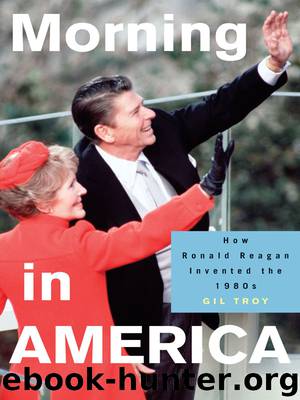Morning in America by Troy Gil

Author:Troy, Gil
Language: eng
Format: epub
Publisher: Princeton University Press
Published: 2013-03-14T16:00:00+00:00
An Economy Fueled by Junk Bonds and Corporate Raiders?
Creative financing became increasingly important in reviving corporate America. “Junk bonds,” low-rated, high-yielding issues for new but potentially very profitable ventures, or for underappreciated and thus underfunded companies, encouraged new entrepreneurs and energized the once sleepy bond market. Elaborate stock swaps, bridge loans, and somewhat risky junk bonds promising high payoffs tomorrow after selling off lucrative corporate assets today allowed lean, aggressive buccaneers to swallow up larger companies in leveraged buyouts, or LBOs.
Michael Milken, an intense, gawky Californian, was the junk-bond guru. Milken was one of those brilliant outsiders who in breaking into the Wall Street club transformed it. A workaholic who slept only three to four hours a night, when he was young and commuting from New Jersey he rode the bus so he could read financial statements rather than feel compelled to chat with colleagues on the train. Oblivious to social convention, on winter mornings he wore a miner’s lamp strapped to a leather aviation cap to illuminate his papers during his two-hour predawn bus ride to lower Manhattan.
By 1985 the forty-year-old had moved his operation out to Beverly Hills so he could raise his two children with a nice backyard and good weather. He was earning $25 million a year and was reputed to be worth twenty times that, having pioneered a $125 billion market. The Wall Street Journal would pronounce Milken the most influential financier since J. P. Morgan.
In preaching the junk-bond gospel, Milken embraced the notion of capitalism as “creative”—and lucrative—destruction. Stagflation had left many companies’ stocks undervalued. Milken believed he was performing a public service by providing access to new money while nurturing fledgling ventures. He railed against corporate fat that fed only corporate executives’ egos. He criticized conglomerates for losing their focus and advocated selling off extraneous businesses to forge a flush, focused company. Critics called it cannibalizing the company’s assets. Milken called it progress.
Milken sometimes suffered from the zealot’s tunnel vision. His market gospel reduced everything to a financial transaction and ignored the subtleties essential to weaving a resilient social fabric. Obsessed with financial capital, he shortchanged human and social capital. Applying Wall Street’s cold calculus to Main Street, he flirted with social heresy by saying, “It doesn’t make sense to pay the mortgage.” Mortgages were essentially leveraged buyouts, where “you put down $5,000 and get $100,000.” So, if your house price “goes up, you make a fortune. If the price goes down, you just put up $5,000—what the hell, you got tax write-offs and you go home and walk.” Such coarsening and commodifying of social obligations fed many fears regarding the entire junk-bond approach.
The junk-bond market relied on a few wealthy individual and institutional investors. That fact, combined with the corporate world’s hostility, each deal’s complexity, the media’s skepticism, and the unfortunate, misleading moniker—for the bonds were more risky than junky—put a premium on salesmanship. In that spirit, Milken’s white-shoe, 150-year-old firm, Drexel Burnham, hosted two thousand CEOs, investors, and corporate raiders annually. One money manager called the conference “a revival meeting.
Download
This site does not store any files on its server. We only index and link to content provided by other sites. Please contact the content providers to delete copyright contents if any and email us, we'll remove relevant links or contents immediately.
| American Revolution | Civil War |
| US Presidents |
Fanny Burney by Claire Harman(25784)
Empire of the Sikhs by Patwant Singh(22172)
Out of India by Michael Foss(16312)
Leonardo da Vinci by Walter Isaacson(11903)
Small Great Things by Jodi Picoult(6095)
The Six Wives Of Henry VIII (WOMEN IN HISTORY) by Fraser Antonia(4790)
The Wind in My Hair by Masih Alinejad(4424)
The Lonely City by Olivia Laing(4120)
The Crown by Robert Lacey(4105)
A Higher Loyalty: Truth, Lies, and Leadership by James Comey(4032)
The Iron Duke by The Iron Duke(3639)
Millionaire: The Philanderer, Gambler, and Duelist Who Invented Modern Finance by Janet Gleeson(3569)
Sticky Fingers by Joe Hagan(3454)
Alive: The Story of the Andes Survivors by Piers Paul Read(3310)
Papillon (English) by Henri Charrière(3269)
Joan of Arc by Mary Gordon(3258)
Stalin by Stephen Kotkin(3086)
Aleister Crowley: The Biography by Tobias Churton(3019)
Ants Among Elephants by Sujatha Gidla(2924)
